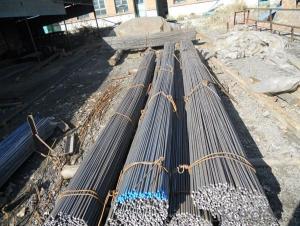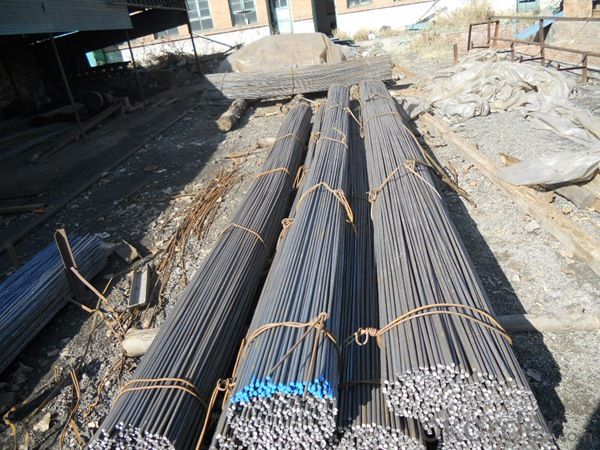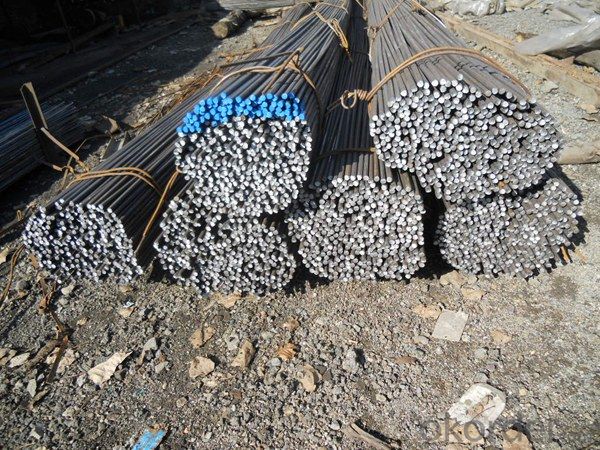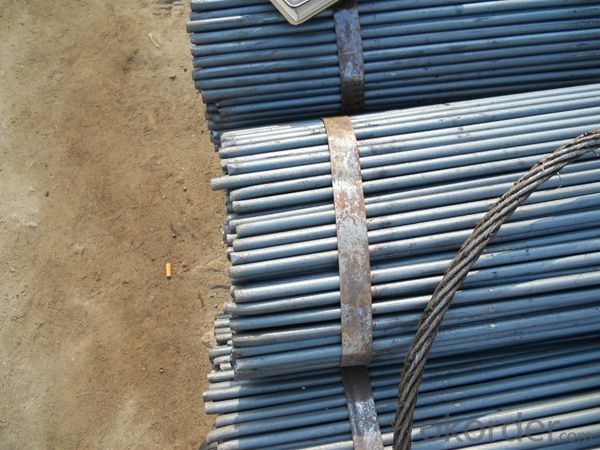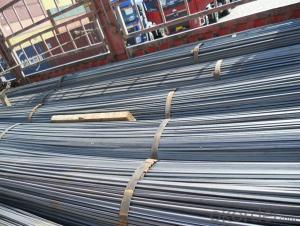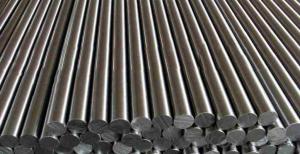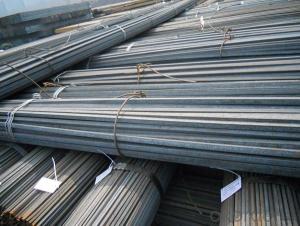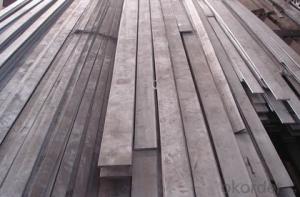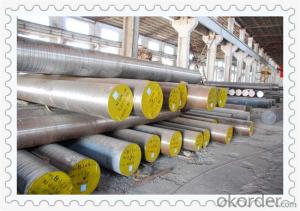Mild Hot Rolled Steel Round Bars for Bults and Nults
- Loading Port:
- Tianjin
- Payment Terms:
- TT or LC
- Min Order Qty:
- 25 m.t.
- Supply Capability:
- 200000 m.t./month
OKorder Service Pledge
OKorder Financial Service
You Might Also Like
Product Description:
OKorder is offering high quality Mild Hot Rolled Steel Round Bars for Bults and Nults at great prices with worldwide shipping. Our supplier is a world-class manufacturer of steel, with our products utilized the world over. OKorder annually supplies products to European, North American and Asian markets. We provide quotations within 24 hours of receiving an inquiry and guarantee competitive prices.
Product Applications:
Mild Hot Rolled Steel Round Bars for Bults and Nultsare ideal for structural applications and are widely used in the construction of buildings and bridges, and the manufacturing, petrochemical, and transportation industries.
1. Steel round bar products is used in construction and a large number of architectural and engineering structures. And it can be used in production of handrail, windows, machinery, telecom and curtain wall.
2. It can be used in the fields like metal mines, cement plants, water coal slurry, power stations and chemical industry.
3. Besides, we can supply some especial material steel round bar that can be used for main shaft of steamer, hummer shank, with big section and supper force.
4. Recommended watchcase factory, screw factory and other cold stamping products industry use.
Product Advantages:
OKorder's Steel I-Beams are durable, strong, and resist corrosion.
1. The steel in which the main interstitial alloying constituent is carbon in the range of 0.12–2.0%.
2. As the carbon percentage content rises, steel has the ability to become harder and stronger through heat treating; however it becomes less ductile.
3. Regardless of the heat treatment, higher carbon content reduces weld ability. In carbon steels, the higher carbon content lowers the melting point.
4. Quality should be in conformity with the specification of the manufacturer. Quantity and packing conditions should be in conformity with the term in the contract.
Main Product Features:
· Premium quality
· Prompt delivery & seaworthy packing (30 days after receiving deposit)
· Corrosion resistance
· Can be recycled and reused
· Mill test certification
· Professional Service
· Competitive pricing
Specifications of Mild Hot Rolled Steel Round Bars for Bults and Nults
1. Grade: Q235, A36, SS400, S235JR
2. Feature: Unbreakable, grinding resistant and high impact value
3. Diameter: 8mm-150mm
4. Performance: Mainly for civil construction
5. Characteristics: Even hardness, no deformation, no breaking, no mal-roundness
6. Technique: Hot rolled
7. Mass: Mass (kg/m) = Diameter (mm) × Diameter (mm) × 0.00617
Packaging & Delivery of Mild Hot Rolled Steel Round Bars for Bults and Nults
Packaging Detail: All goods are packed in bundle with steel strips and shipped by break bulk vessel or container (depend on target market and different ports)
Delivery Detail: 45 days
Trade terms: FOB, CFR, CIF
MOQ: 25 tons per specification; we can negotiate the quantity if the specification is normal or we have stock of one specification.
Weight: The price invoicing on theoretical weight basis or actual weight basis depends on customer’s request.
Shipment: The shipment of bulk break or container is depends on customer’s request and the situation of the port of destination.
Documents given: Full set of original clean on board bill of lading; Original signed commercial invoice; Original packing list; Policy of insurance; Certificate of origin and what the target market needs.
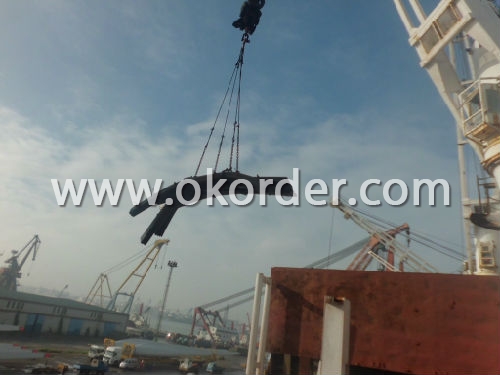
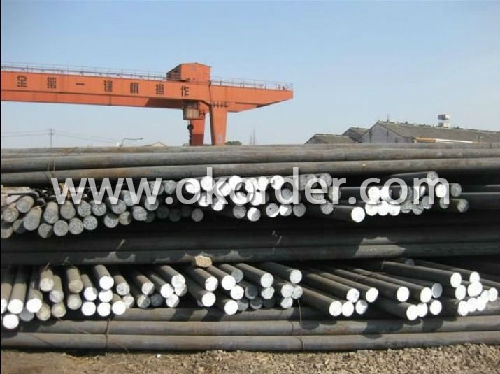
Production Flow of Mild Hot Rolled Steel Round Bars for Bults and Nults
Material prepare (billet) — heat up — rough rolling — precision rolling — cooling — packing — storage and transportation
FAQ:
Q1: The products are invoicing on theoritical weight or on actual weight?
A1: We can do it in both manners, according to the customers' request.
Q2: What is the normal tolerance of Hot Rolled Mild Steel Angle Beams for Structures and for Buildings?
A2: Normally 3%-5%, but we can also produce the goods according to the customers' requests.
Q3: How soon can we receive the product after purchase?
A3: Within three days of placing an order, we will begin production. The specific shipping date is dependent upon international and government factors, but is typically 7 to 10 workdays.
- Q: What is the hardness of a steel round bar?
- The hardness of a steel round bar may differ depending on the type of steel and the manufacturing process utilized. To measure the hardness of steel, the Rockwell hardness scale is commonly employed. This scale determines the depth of indentation caused by a specific load on a diamond or steel ball. Steel round bars generally exhibit hardness values ranging from approximately 20 to 60 Rockwell C (HRC), with higher values indicating greater hardness. However, it is crucial to acknowledge that the hardness of a steel round bar can also be affected by factors such as heat treatment, alloying elements, and any applied surface treatments. Consequently, it is imperative to refer to the manufacturer or supplier's specified hardness specifications to accurately ascertain the hardness of a steel round bar.
- Q: How do you determine the strength of a steel round bar?
- The strength of a steel round bar can be determined through various methods, but the most common approach is by conducting a tensile test. This test involves applying a controlled force to the bar until it fractures, allowing for the measurement of its ultimate tensile strength (UTS). Other important parameters, such as yield strength, elongation, and reduction in area, can also be determined from the test results. Additionally, the chemical composition and microstructure of the steel can provide valuable insights into its overall strength and performance characteristics.
- Q: Can steel round bars be used for gear applications?
- Yes, steel round bars can be used for gear applications. Steel round bars are often used in the manufacturing of gears due to their high strength and durability. They provide excellent mechanical properties, such as hardness and wear resistance, which are essential for gear applications. Steel round bars can be machined and heat-treated to achieve the desired tooth profile and surface finish required for gears. Additionally, steel round bars offer good dimensional stability and can withstand high loads and torque, making them suitable for various gear applications in industries such as automotive, machinery, and heavy equipment.
- Q: Can steel round bars be used for making fasteners or bolts?
- Certainly! The utilization of steel round bars is viable for the production of fasteners and bolts. Steel is widely employed as a material for these components due to its exceptional robustness, longevity, and resistance against corrosion. The round bars, crafted from steel, can be effortlessly manipulated and threaded, enabling the creation of an array of fasteners and bolts such as screws, nuts, and threaded rods. The selection of the precise steel grade hinges upon the specific application and desired strength properties. Nevertheless, it is imperative to bear in mind that the manufacturing process and stringent quality control are paramount in guaranteeing the dependability and performance of the end product.
- Q: What's the difference between Q345 round steel and No. 45 round steel material?
- Q345: it is a kind of manganese steel (16Mn), yielding strength of 345, good welding performance, commonly used in structural parts welding, low carbon steel, can not be used for quenching or quenching and tempering.No. 45 Steel: high quality carbon structural steel, medium carbon steel. Can be used for quenching or tempering.
- Q: What are the different types of steel round bar alloys used in the marine industry?
- In the marine industry, various types of steel round bar alloys are used due to their strength, corrosion resistance, and other specific properties required for marine applications. Some of the commonly used steel round bar alloys in the marine industry include: 1. Stainless Steel: Stainless steel, particularly grades like 316 and 304, is extensively used in the marine industry. These alloys have excellent corrosion resistance, making them suitable for marine environments where exposure to saltwater and moisture is common. Stainless steel round bars are also known for their high strength and durability. 2. Carbon Steel: Carbon steel round bars are another commonly used alloy in the marine industry. They are known for their strength and toughness, making them suitable for various marine applications. However, carbon steel is more prone to corrosion compared to stainless steel, so proper maintenance and protective coatings are necessary. 3. Duplex Stainless Steel: Duplex stainless steel round bars, such as SAF 2205, are gaining popularity in the marine industry due to their superior corrosion resistance and high strength. These alloys have a balanced microstructure of ferrite and austenite, providing excellent resistance to pitting, crevice corrosion, and stress corrosion cracking. 4. Copper-Nickel Alloys: Copper-nickel round bars, specifically alloys like 90/10 (90% copper and 10% nickel) and 70/30 (70% copper and 30% nickel), are widely used in the marine industry. These alloys offer excellent resistance to seawater corrosion, erosion, and biofouling. Copper-nickel alloys are commonly used in seawater piping systems, heat exchangers, and condensers. 5. Aluminum Alloys: Although not steel, aluminum round bars are also used in the marine industry, especially for lightweight applications. Aluminum alloys, such as 6061 and 5083, offer good corrosion resistance and high strength-to-weight ratio. They are commonly used in boat building, mast structures, and other marine components. It is important to note that the selection of steel round bar alloys in the marine industry depends on specific application requirements, environmental conditions, and budget considerations. Consulting with marine engineers and industry experts can help in choosing the most appropriate alloy for a particular marine application.
- Q: How do you calculate the weight of a steel round bar based on its volume and density?
- To calculate the weight of a steel round bar based on its volume and density, you can use the formula: Weight = Volume x Density First, determine the volume of the round bar. The volume of a cylinder, which is the shape of a round bar, can be calculated using the formula: Volume = π x (diameter/2)^2 x length Where π is a mathematical constant approximately equal to 3.14159, and the diameter and length are measurements of the round bar. Once you have the volume, you need to know the density of the steel. The density of steel can vary depending on the type and grade of steel being used. The density is usually measured in kilograms per cubic meter (kg/m^3) or pounds per cubic inch (lbs/in^3). You can find the density of steel in reference materials or online. Finally, multiply the volume by the density to obtain the weight of the steel round bar. Make sure the units of volume and density are consistent. For example, if the volume is in cubic inches and the density is in pounds per cubic inch, the weight will be in pounds. If the volume is in cubic meters and the density is in kilograms per cubic meter, the weight will be in kilograms. It is important to note that this calculation assumes the round bar is made entirely of steel and has a uniform density throughout its volume. Additionally, this calculation does not consider any other factors that may affect the weight, such as impurities or surface finish.
- Q: Are steel round bars suitable for use in the marine industry?
- Yes, steel round bars are suitable for use in the marine industry. Steel is a highly durable and strong material, making it ideal for marine applications where there is exposure to harsh environmental conditions such as saltwater, waves, and corrosion. Steel round bars offer excellent tensile strength and resistance to impact, making them suitable for various marine components like shipbuilding, offshore structures, and marine equipment. Additionally, steel is also readily available, cost-effective, and can be easily fabricated to meet specific requirements, making it a popular choice in the marine industry. However, it is important to select the appropriate grade of steel that has good corrosion resistance, such as stainless steel, to ensure long-term durability and performance in marine environments. Regular maintenance, including proper coating and protection against corrosion, is also crucial to enhance the lifespan of steel round bars in marine applications.
- Q: How do steel round bars perform in high-temperature environments?
- Steel round bars generally perform well in high-temperature environments due to their high heat resistance and thermal stability. The composition and manufacturing process of steel bars allow them to retain their mechanical properties, such as strength and hardness, even at elevated temperatures. However, the specific performance of steel round bars in high-temperature environments can vary depending on factors like the grade of steel, duration of exposure, and the presence of corrosive agents.
- Q: Can steel round bars be used in the shipbuilding industry?
- Yes, steel round bars can be used in the shipbuilding industry. Steel round bars are commonly used in shipbuilding for various applications such as constructing hulls, decks, bulkheads, and other structural components. They offer excellent strength, durability, and corrosion resistance, making them ideal for withstanding the harsh marine environment. Steel round bars can be easily welded, machined, and formed into desired shapes, providing flexibility in ship construction. Additionally, their availability in various sizes and grades allows for customization to meet specific shipbuilding requirements. Overall, steel round bars are essential materials in the shipbuilding industry due to their robustness and reliability.
Send your message to us
Mild Hot Rolled Steel Round Bars for Bults and Nults
- Loading Port:
- Tianjin
- Payment Terms:
- TT or LC
- Min Order Qty:
- 25 m.t.
- Supply Capability:
- 200000 m.t./month
OKorder Service Pledge
OKorder Financial Service
Similar products
Hot products
Hot Searches
Related keywords
